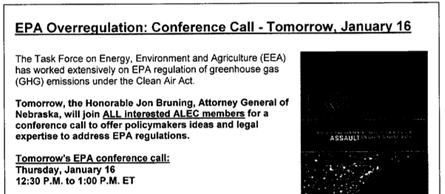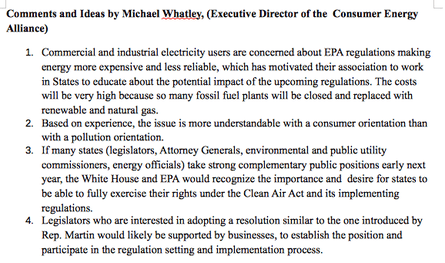The central pillar of Barack Obama's climate change agenda has come under a new line of co-ordinated attack from influential lobbying networks involving Republican politicians and big business.
The Guardian has learned that the American Legislative Exchange Council (Alec), a free market group of state legislators funded in part by coal and oil companies such as Peabody Energy and Koch Industries, launched a much broader style of campaigning in 2014 to block the Environmental Protection Agency (EPA) from cutting greenhouse gas emissions from power plants.
Documents obtained by the Guardian offer a rare glimpse into the inner workings of Alec as the organisation tried to drum up opposition from coal, oil and electricity industry groups and state officials.
The documents showed Alec adopting a new tactic of encouraging state attorney generals to bring lawsuits against the new EPA regulations – and so sink the emissions controls before they come into effect. Alec also encouraged legislators to lobby attorney generals and governors in other states on the EPA rules, the documents showed.
Meanwhile, Alec legislators introduced about a dozen anti-EPA bills in states including Arizona, Florida, Ohio and Virginia.
Alec is expected to reassess its strategy against the EPA rules on 2 May during a meeting of its energy and environment taskforce in Kansas city. Alec also organised a field trip to a coal-fired power plant during the meeting, according to the agenda posted on the Alec website.
The current campaign emerged on the sidelines of Alec's annual meeting in Washington DC last December when the energy, environment and agriculture taskforce met behind closed doors to discuss how to mobilise state attorney generals, pro-industry groups and power companies to block the EPA.
The strategy was a departure for Alec, which has a reputation for crafting and promoting pro-industry legislation in the states, but has not generally been involved in broader campaigning.
Alec followed up on the roundtable by hosting a briefing from Nebraska's attorney general, Jon Bruning, author of a legal brief challenging the EPA's authority to cut greenhouse gas emissions.
Bruning, who is also running for governor of Nebraska, has led opposition from attorney generals to the EPA regulations – 17 of whom signed on to his brief.
In the conference call, Alec members discussed reaching out to attorney generals and other officials to consolidate opposition to the EPA regulations.

“EPA continues to try and 'fix things' that are not broken,” Bruning said during the 16 January conference call, according to notes prepared and circulated by the Consumer Energy Alliance (CEA), an oil industry-supported group that was on the call.
“Encourage state Attorney's (sic) General to fight EPA power grab,” Bruning went on, according to the notes prepared by the CEA's then senior policy director, Bo Ollison.

The document was obtained through a public records request by the Centre for Media and Democracy (CMD), and made available to the Guardian. Ollison, when asked, did not dispute the accuracy of the document.
"Alec has become quite well known and notorious for promoting model legislation. This is different," said Nick Surgey, director of research for CMD which investigates corporate influence on public policy. "Alec is engaging much more broadly in the campaign against the EPA regulations, and they are doing so by asking their members to advocate for the coal industry with attorney generals. That is very unusual for them."
Surgey went on: "They are organising conference calls. They are asking their members to activate more attorney generals and other friendly attorney generals who will litigate this issue."
Alec initially planned to hold monthly conference calls with elected state officials and industry groups to try to put pressure on the White House and EPA, according to the documents.
The January call was joined by an official from American Electric Power, a major supplier in 11 states, as well as state legislators from Alaska, Nebraska, North Dakota and Wyoming.
A spokeswoman for American Electric Power confirmed in an email that Paul Loeffelman, a company official, had participated in the call. AEP is a member of Alec, the spokeswoman confirmed. Loeffelman a co-chair of Alec's energy taskforce.
The spokeswoman, Melissa McHenry, said in the email that the company had been meeting state legislators and utility regulators to discuss its concerns about the incoming EPA regulations. "We believe any greenhouse gas regulations proposed for existing power plants need to be flexible," she said.
Others on the call also voiced their objections to the EPA rules.
“I do believe there is an overreach by the EPA,” said Jim Smith, a Nebraska legislator and Alec state chair, who confirmed his participation in the call to the Guardian. “As I have in the past, I will push for balanced emission standards that do not cripple our ability to meet the demands for efficient and affordable energy.”
The EPA proposed new rules for future power plants late last year, and is due to outline the standards for existing power plants in June.
Power plants are the biggest single source of greenhouse gas emissions, and the proposed EPA rules are at the core of Obama's climate change strategy.
The proposed rules for future power plants would make it impossible to build new coal-fired power plants without investing in new carbon capturing technologies. Republican elected officials and industry groups have accused the EPA of waging a "war on coal".
With those regulations looming, Alec and other industry groups such as the CEA, and the Energy Producing States Coalition (EPSC) – that represents coal- and oil-producing states – have begun working closely together and with state officials to try to block the EPA.
“GHG [greenhouse gas] rules have the potential of crippling the United States economy,” said Tom Lubnau, the Wyoming house speaker, and a past chair of the EPSC. “GHG rules have the potential of placing a $100bn additional fixed cost on the system by requiring the construction of new power-generation facilities.”
At the informal talks in Washington last December, Alec members suggested state legislatures should budget "for their attorney generals to litigate if needed" against the EPA rules.

The meeting also discussed founding a formal multi-state coalition against the EPA regulations.
“If many states (legislators, attorney generals, environment and public utility commissioners, energy officials) take strong complementary positions early next year, the White House and EPA would recognise the importance and desire for states to be able to fully exercise their rights under the Clean Air Act and its implementing regulations,” Michael Whatley, the founder of the pro-industry Consumer Energy Alliance told the meeting.

Alec also remains active on other environmental issues. The group is tracking some 130 bills in state legislatures to support the Keystone XL pipeline project, block controls on fracking, and make it more expensive for homeowners to invest in solar panels – as well as block the EPA regulations, according to internal documents.
The EPA-focused bills assert that coal is an important domestic energy source, and that America has already achieved emissions reductions without regulating power plants – although those reductions were the result of a switch to cheaper natural gas.
Alec also introduced bills in Alabama, Florida, Nebraska and other states to weaken EPA standards.











Comments (…)
Sign in or create your Guardian account to join the discussion